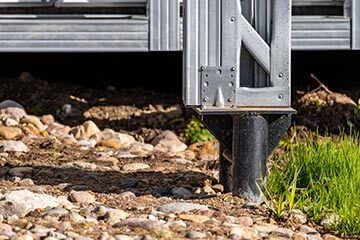Keeping your house locked and secure is just one of our top tips to protect your home from burglars. And it’s worth taking these extra steps.
21%* of homeowners and renters we asked said their home or garden has been burgled at least once. Almost a third of respondents (32%) made an insurance claim for items stolen after being burgled.
A good home insurance policy helps you recover the cost of your belongings, but our tips could stop burglars gaining entry in the first place.
Read on for simple steps you can take to stay safe.
*Research was carried out by OnePoll on behalf of Confused.com. A survey of 2,000 UK drivers was conducted between 17 and 22 May 2024.

1. Secure your doors and windows
Keep your doors and windows locked, even when you’re home. Something as simple as locking up could be enough to protect your home from a casual thief.
Unlocked or open windows and doors are not only a gift to opportunistic burglars but they could also invalidate your home insurance.
2. Make sure your door and window locks are in good condition
Always ensure that your window and door locks meet the standards set by your home insurance company. This means they’re not loose or broken.
Having a secure home at all times means you're less likely to have a break in. But if a thief does get into your home, your insurer is more likely to pay out if your door and window locks were secure in the first place. This is one to double check in the summer months when you’re more likely to leave a window or garden patio door open by accident.
If you’ve just moved into your home it makes sense to change the locks as tradespeople or neighbours could have copies of your keys.
Alternatively, you might want to consider upgrading to ‘smart keys’. You can update smart keys using a simple re-keying process. This makes it easier whenever a key is lost or you want to change the lock.
3. Store your keys in a secure place
Always keep your keys away from your front door in a locked box or safe. If you leave your keys on a table by the door, for example, thieves might hook these through the letterbox and let themselves in.
This goes for your car keys too. Criminals are opportunistic, so if there’s an easy chance to steal your car they’ll probably take it.
4. Regularly change your alarm codes
Security experts suggest you change your alarm code on your home security device every 6 months at least.
You should also change it whenever you feel your home security might have been compromised - for example if you’ve been broken into previously.
5. Invest in smart home security
Smart home tech could be an easy, affordable option if you want to enhance your home security. You can hook your outdoor lights to your Wi-Fi and automate when they come on. And a smart doorbell camera lets you know who's lurking outside without you needing to go near the door. Many of these gadgets are self-install, so you don't need to worry about getting someone in to sort it for you.
6. Keep your valuables away from the windows
Windows allow thieves to see straight into your home. Remove any high-value items from near the window so thieves can't take inventory by peering in. Also be mindful of what's visible in your bins, for example TV boxes, so you don't advertise what's in your house.
7. Leave an indoor light on
If you’re away, it’s worth considering using timers to switch your lights on and off. Or get a trusted person to switch lights on and off for you. Don’t leave a light on that gives thieves a prime view of your new TV though.
8. Install outdoor lighting
Installing outside lighting means less cover for burglars. You can also use motion sensors to switch them on if someone is approaching your home. This might give thieves enough pause to not bother trying to enter your home.
9. Get anti-climb fencing and a prickly hedgerow
Proper fencing and hedgerows can be an effective deterrent for thieves. A prickly hedgerow can deter burglars from trying to get into your home through the garden. And anti-climb toppings on your fence such as plastic spikes can make it difficult for burglars to climb over.
A small fence or hedge at the front of your property means burglars are more visible to your neighbours, so they're less likely to break in. Crimestoppers recommend around 1 metre for the front hedge or fence. At the rear of the property go for a 1.8 metre hedge or fence. This should make it hard for burglars to gain access to your home and also make it harder for them to escape.
A dense and prickly hedge makes it even more difficult.
Mick Duthie, Director of Operations at Crimestoppers says:
"A high front hedge gives [criminals] cover while they’re in a property or garden, and a low rear hedge gives them easy access to escape out the back.
"It’s not just the height of your hedge that can put off burglars. We recommend keeping all hedges thick, prickly and dense to further deter intruders. This is particularly effective for back hedges, as a robust hedge can block the escape of thieves who attempt to exit via the back garden."
John Blackstaff, Plant Nursery Manager at the John Lewis Partnership’s Leckford Estate says:
“There are plenty of hedge species that provide additional security without compromising the appearance of your garden.
"I recommend Pyracantha, Firethorn - an evergreen, vigorous and thorny plant, as its name suggests.
"A holly bush is also a good traditional evergreen whose prickly leaves will ward off intruders. For something a bit brighter, try Rose Glow, which has lovely copper and pink leaves, or Blackthorn, which blossoms in spring. Both can act as impenetrable yet stylish barriers.”
Be mindful that any hedges need to be less than 2 metres in height to avoid potential neighbour disputes.
10. Secure your garden
Your garden can be as much of a target to thieves as your house. Upping your garden security - as well as the security of any sheds, outbuildings, storage boxes or summer houses in it - is a good idea.
According to the police, things like laying gravel in your garden or installing security lights are a quick and easy way to make it trickier for thieves to silently sneak around it. Installing locks on your garden buildings and storage units can be a big help too.
And don’t overlook the effectiveness of a secure garden gate either.
Simple behaviour changes like ensuring your tools are safely locked away can be effective too. The harder you make it for thieves to target your garden, the better.
If your garden does become a target for burglas, many home insurance policies will cover you. Just make sure to check your policy documents to see exactly what you can claim for.
11. Keep where and when you’re going away to yourself
Avoid social media posts that show you’re on holiday, for example, checking in at holiday destinations and posting pictures. This indicates to thieves that the house is going to be empty. If you’re away, it’s worth letting a trusted friend know so they can keep a look out for any suspicious activity.
12. Get a safe
A strong home safe protects important documents like passports, birth certificates and insurance documents from both theft and fire.
Thieves can use these documents to steal your identity. Also, anything with great value - sentimental or otherwise - might be better off in a secure place. Make sure you secure the safe itself by bolting it to the floor, for example.
13. Make sure your garage and outbuildings are secure
Make sure you lock and secure your garages, sheds and outbuildings.
If your garage leads into your house, make sure you lock your garage door and any doors leading from the garage into your home.
Also, parking your car directly in front of the garage blocks easy access to the garage itself.
For your shed or outbuildings, it’s worth anchoring them to the ground or to the wall if you can. Then once they’re anchored, use a strong padlock to secure them.
For more tips, read our guide on securing and insuring your shed, garage or outbuildings.







